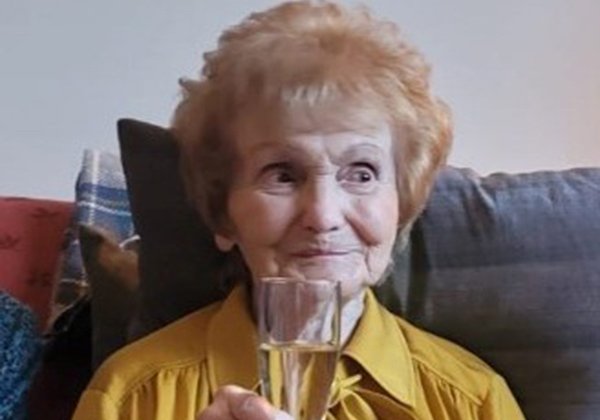Jadwiga ‘Jadzia’ Osostowicz was born on 17 September 1925 in Kraków, the only girl of three children. Her mother, Zofia was a schoolteacher, her father, Stanisław, a village civic leader, politician, and military officer. When Poland was invaded by Stalin’s Red Army in 1939, life changed dramatically for Jadzia and her family. Arrested and deported to a labour camp near the Ural Mountains, they endured inhumane conditions of hunger, cold and forced labour. When amnesty was granted to the Polish prisoners in Soviet Russia in 1941, they left Russia and undertook a 9000-mile journey on foot and train from the Urals across Soviet Russia crossing the Caspian Sea and finally reaching the port town of Pahlevi (today’s Bandar’a Anzali in Iran) where they were eventually evacuated by the British Army to Palestine. They remained there until after the war. This part of Jadzia’s life was recognised on 8 June 2021 when Jadzia was awarded the Siberian Exiles’ Cross, a state decoration granted by the Polish President to Poles who had suffered the deportations in the years 1939 – 1956.
Jadzia’s family settled in England always maintaining close ties with the Polish émigré community in London. Jadzia went to the University of London to study German and started a job as a schoolteacher in St Angela’s Convent School in Forest Gate. She met her husband, Mieczysław (Mietek), a chemical engineer who served as a lieutenant at the Polish Armed Forces during World War II. In 1958, they married and a year later Jadzia gave birth to their only child, Krystyna (Krysia).
In the early 1950s Jadzia met Opus Dei, through Kathrin, a young German student she met in Cologne who suggested visiting a Centre of Opus Dei in London. There Jadzia met the first women members of the Work and learned more about the spirit of the Work. Soon after, Jadzia herself asked to join the Work as a supernumerary. During these years, Jadzia personally met St Josemaria Escriva, first in 1962, during a get-together in Ashwell House in London and later in Barcelona in Brafa Sports College. Both encounters left a deep impression on Jadzia. Especially moved by St Josemaria’s love for the salvation of souls, Jadzia decided to start a club for girls from her own local community. She started with daughters of friends in the area, getting friends and family involved. They did cookery, crafts and had a short talk on the Christian faith. Occasional activities included preparing cards for the Holy Father and organising an annual Christmas play and carol concert inviting the girls’ families. They also organised an annual pilgrimage in May to the local church. Jadzia also tried to get the mothers involved and arranged for them to have a regular doctrine class in the house of one of the supernumeraries nearby. Jadzia ran the club well into her 80s keeping in touch with the girls long after they had left the club.
Jadzia appeared to be a very ordinary person leading a very simple life, while in fact she had a deep spirituality and a strong faith that informed her everyday life. One of the consequences of this was that she had a great capacity for friendships with people of all kinds. She prayed for her friends, and many of them asked her to pray for their intentions, which she always followed up. She never gave up on anyone.
Naturally, she loved her home country, Poland and constantly prayed for the apostolic work there. When she heard that the Work finally started in Poland, she started travelling there for her yearly course and her retreat.
She valued the importance of spiritual formation and always made every effort to attend them, even as she got older when she was unable to travel to the centre she joined in online.
On 17 September 2022, during a party to celebrate Jadzia’s 97th birthday, in the presence of a good group of friends, Krysia made a moving speech about her mother comparing her to her contemporary, Queen Elizabeth II. ‘Like the Queen, my mum, is popular, wise, resilient (she hardly complains), caring, constant, with a life-long devotion to family and friends and a great spirit of service for others. In fact, till recently she had been regularly helping elderly people, many of them much younger than herself.’ To this Jadzia replied, ‘I am very grateful for my long life, I don’t know how long I still have and I’m a bit worried that I may go to heaven with empty hands, I don’t want to go with empty hands. I want to be faithful to the end.’
Later that evening, she felt unwell and was taken to hospital. She died two days later on the morning of 19 September.
